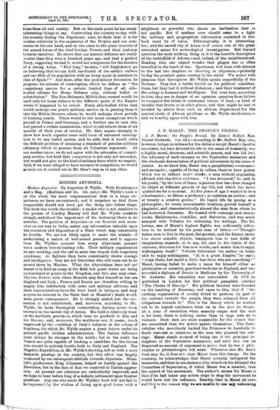MODERN ABYSSINIA.
Modern. Abyssinia. By Augustus B. Wylde. With Frontispiece and a Map. (Methuen and Co. 15s. net.)—Mr. Wylde's book is on the whole the most ungrammatical that in a large ex- perience we have encountered ; and it surprises us that those responsible should not have got the thing into better shape. The book was worth the trouble : a reader who is not sensitive to the groans of Lindley Murray will find Mr. Wylde readable enough, and about the importance of his testimony there is no mistake. The position of Abyssinia on our frontier, and more- over on our way to India, makes any information valuable upon the resources and disposition of a State which may conceivably be hostile. We are not likely again to make the mistake of underrating a nation of well-armed peasants, and it appears from Mr. Wylde's account that every Abyssinian peasant has a modern breech-loading rifle. Their military organisation he saw working, and the call to arms was obeyed with surprising quickness. As fighters they have consistently shown courage and intelligence : they are not Dervishes who will come out to be mowed down by Maxims. What the Abyssinians have not yet learnt is to feed an army in the field, but great stores are being accumulated at points in the Kingdom, and this also may come. The two Powers with whom Menelek may find himself at war are England-and Italy ; France and Russia are therefore willing to supply him indefinitely with arms and military advisers, and their representatives have the freer hand in intrigue, and may acquire an interest in the State that at Menelek's death would have grave consequences. He is strongly seated, but the suc- cession is not established; and, moreover, according to Mr. Wylde, he lacks theological consecration, having never been crowned in the sacred city of Axum. His hold is relatively weak on the northern provinces, which bear no goodwill to him and hi Shoans ; and, moreover, the northerns are, it seems, much impressed by the condition of Italy's subjects in the colony of Erythres, for which Mr. Wylde augurs a great future under its present pacific civilian administration. The Italian influence must always be stronger in the north; but in the south the French are quite capable of backing a candidate for the throne who should be actively hostile both to Italy and England. The Magdala Expedition, on Mr. Wylde's showing, left us with a most desirable.- prestige in the country, but this effect was largely weakened by our subsequent attitude towards Abyssinia. Ilene- lek's predecessor, King Johannes, helped us loyally against the Dervishes, but in the face of that we connived at Italian aggres- sion. At present our relations are undoubtedly improved, and we hope to hear before long of a definite settlement upon frontier questions. Any one who reads Mr. Wylde's book will not fail to be impresse I by the wisdom of living up3n good terms with a neighbour so powerful who shows no inclination that is not pacific. But if matters ever should cone to a fight the military and geographical information coutained in this book must be of value. Ethnologically, it is interesting too ; and the sacred city of Axum is of course one of the great unworked mines for archeological investigation. But beyond question the most striking thing in it is the horrible description of the battlefield of Adowa,—and, indeed, of the neighbourhood. Reading this, one cannot wonder that plague has so often travelled in the track of war. Sportsmen will turn with interest to the last two chapters on shooting in Abyssinia,—prebably to-day the greatest game country in the world. We notice with pleasure that throughout Mr. Wylde speaks .respectfullyof the Italians. They lost a battle forced on for political considera- tions, but they lost it without dishonour; and their treatment of the colony is humane and intelligent. Yet even here, according to him, they are in danger of an agrarian question from failiire to recognise the tribal or communal tenure of land,—a kind of trouble that fronts us in other places, and that might be met or avoided by advice from such an African Department for the general study of African problems as Mr. Wylde desiderates,— and we heartily agree with him.






















































 Previous page
Previous page